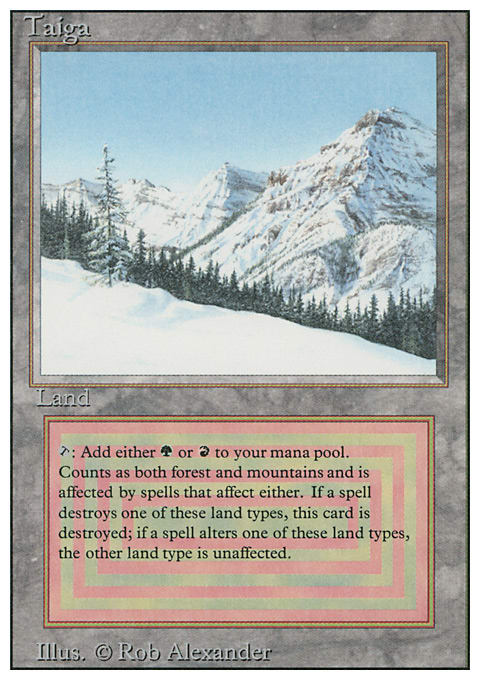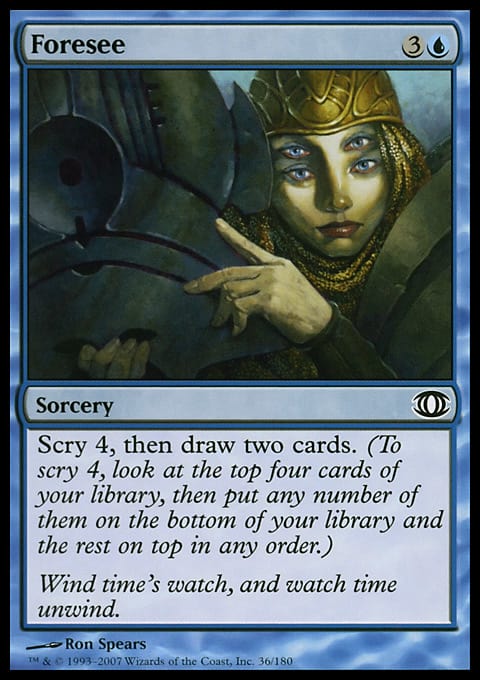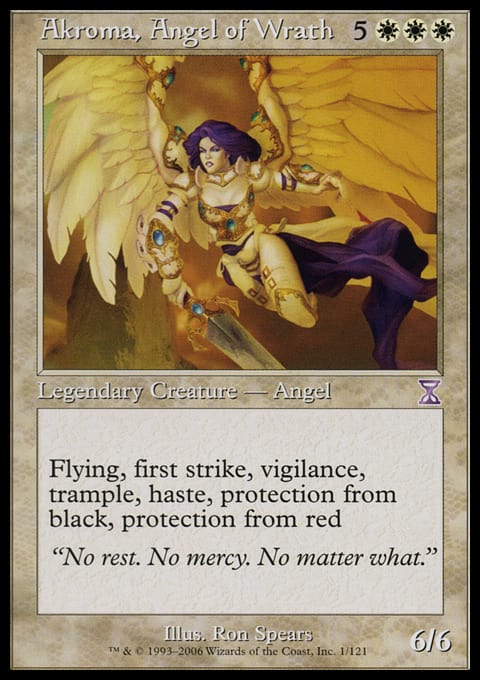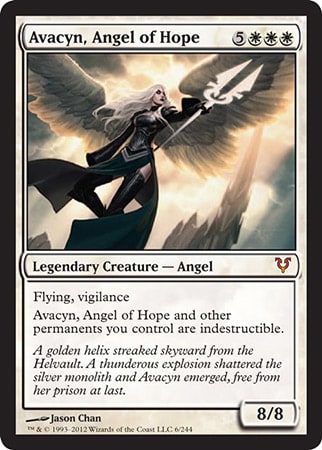Let’s talk about mulligans.
The original rules of Magic did not include an option to mulligan. You were stuck with whatever seven cards fate decided to bestow upon you. Many groups came up with house rules, and various editions of the official rulebook had all sorts of versions. You could mulligan away any number of no-land hands. You could mulligan once if you had all lands or no lands. You could mulligan once on weekdays, twice on Saturdays, and not at all not on Sundays. (I may have made that last one up.)
Eventually, Magic developed the Paris mulligan we know and love today, named for the first major tournament at which it was used. You may mulligan whenever you want without revealing your hand, but each time you do so, you draw a hand of one fewer card. In multiplayer games, you have one free mulligan during which you draw back to a full starting hand of cards.
The standard Paris mulligan isn’t quite sufficient for Commander. In most games of Magic, a bad hand means ten minutes of frustration while your opponent beats you to death. In Commander, it may mean spending two hours crippled and unable to affect the game. Friendly Commander games usually allow players several free mulligans to find a playable hand as long as the leniency is not abused. (Though this can still encourage bad deck building if used too liberally.)
 |
The league allows free mulligans for hands with fewer than three lands,so my deck runs three lands. My mulligans usually take a while.
Because Commander games are long and are usually not played in multigame matches, the format uses a modified mulligan rule designed to alleviate mana-light hands without significantly increasing the odds of finding individual cards. This is also known as the Brittany mulligan rule.
- In turn order, players may set aside face-down some or all of the cards in their hands.
- Each player then draws one fewer card from his or her deck than the number he or she set aside.
- Players who set aside at least one card may return to Step 1 and repeat the process, drawing one fewer card each time.
- Players shuffle all set aside cards into their deck.
It is worth noting that even with this form of mulligan, decks playing an insufficient number of mana sources will routinely draw poor hands or insufficient mana as the game progresses.
However, the Commander rules need an official mulligan so that people know what to expect in an unknown group. In September 2009, Elder Dragon Highlander (as it was known at the time) adopted the Partial Paris.
The stated intent of the partial Paris mulligan is to reduce mana screw. To that end, it allows you to mulligan only part of your land while keeping the rest. Additionally, it saves time by using “exile” mulligans, setting aside mulliganed cards rather than shuffling them in before drawing.
The partial Paris also negates the free mulligan normally granted in multiplayer, which helps to compensate for its powerful flexibility. However, many groups (especially online) allow a free partial Paris, drawing back up to seven cards on the first mulligan. I consider this practice completely degenerate. It makes mulliganing the correct decision ninety-five percent of the time, and it vastly empowers combo decks by allowing them to dig for pieces without card disadvantage.
The free partial Paris is terrible for the game and is completely counter to the stated rules of the format, but I’ve walked into many circles where it is an accepted practice, and people are offended if you object.
Using the Partial Paris
The most important strategy in using the partial Paris mulligan effectively is to minimize the possibility of needing a second (or third) mulligan. Starting with six cards is an inconvenience—starting with four is a death sentence. What this means is that you should usually mulligan more cards than is immediately apparent.
Say your opener is a one-lander that really needs a second land to be keepable. Maybe you have Forest, Cultivate, and five random spells. You might figure that with thirty-seven lands left in your deck, mulliganing three cards gives you pretty good odds of drawing one. In fact, the odds of hitting another land in your top two cards is about 64%—just under two thirds. That means that by only mulliganing three cards, you have a substantial chance of having to mulligan again, going down to a starting hand of five cards and hoping to God you don’t have to go to four.
If you instead set aside four cards with your first mulligan, you still have a one-in-four chance of missing a land. Even tossing back five cards, you’re still only at an 86% chance of drawing a land. Unless you’re keeping something that is substantially better than the rest of your deck, you will almost always want to toss back the five other cards in our hypothetical one-land-plus-Cultivate hand.
On the opposite end of the spectrum, what if you draw too many lands? Some decks will happily keep seven lands, but others need early action and will be squirming with more than three. Once again, your best bet is to throw back more cards than you’d expect. If your ideal starter is three lands, I’d usually only keep two in hand when making my first mulligan, assuming I’d rather take a small chance of starting with only two lands than a large chance of only two spells.
Finally, you can take a partial Paris for value even with a perfectly reasonable hand. Let’s say I’m playing my Isperia the Inscrutable deck and draw the following seven:
 |
 |
 |
This hand has a great opening curve of Signet, Foresee, and Isperia, but it also has two 8-drops that will be effectively blank for much of the game. I would seriously consider mulliganing an Island and the legendary Angels for two random cards off the top.
The Problem
I think the partial Paris is an interesting mulligan with a lot of strategic depth. I also think that it is an absolutely terrible choice for a casual format like Commander.
It punishes small mistakes harshly, and it will regularly mana screw new players who don’t throw back enough cards. It doesn’t give an opportunity to make up for insufficient shuffling. It increases the number of degenerate hands by allowing players to keep awesome early plays (Sol Ring, Serra Ascendant, and so on) while mulliganing the rest of an unkeepable hand.
I don’t understand how this rule is still on the books—none of the Commander rules committee members I’ve talked to actually play with it. Many casual players have never heard of it, and many others use the degenerate free version. The only people who actually play with the partial Paris properly are one-on-one players and enfranchised playgroups who don’t actually need the official rules to establish neutral guidelines.
I’d happily listen to other suggestions for mulligan rules that people would actually follow, but here’s the one I’ve been advocating for a while:
Because Commander games are long and usually not played in multigame matches, the format uses a custom mulligan rule that allows some flexibility and reduces shuffling. This is also known as the two-shuffle mulligan.
- In turn order, each player may take one free mulligan by shuffling his or her hand into his or her deck and drawing a new hand of seven cards.
- Continuing in turn order, each player who did so may then take any number of “exile” mulligans, setting aside his or her hand face-down and drawing a new hand with one fewer card each time.
- Once all players have kept opening hands, players shuffle all set aside cards into their decks.
In friendly games in which participation is more important than competition, the following optional rule can be employed:
- When a player takes his or her first exile mulligan only, that player may set aside his or her hand face-up instead of face-down. If a player does and that hand contains two or fewer land cards, that player may draw back up to the full seven cards on that mulligan.
The official rules should be something people will actually play with. The British mulligan is designed to roughly codify common casual habits into an official procedure. You have one free mulligan with a chance to reshuffle your deck, and you then start drawing new hands off the top to save time.
The optional land-light-free-exile mulligan is a recent addition. It may seem a bit hacky to put an optional clause in official rules, but I think it has some merit. You often want to give friends who are having legitimate bad luck a bit of leeway, but it can be difficult to negotiate exactly how much in a four-player game. This provides a solid baseline expectation of, “You can have one more freebie if you’re mana-screwed, but after that, you’re going down a card with the rest of us.”
What do you think of the partial Paris? How about of the British mulligan? Let me know in the comments!



























